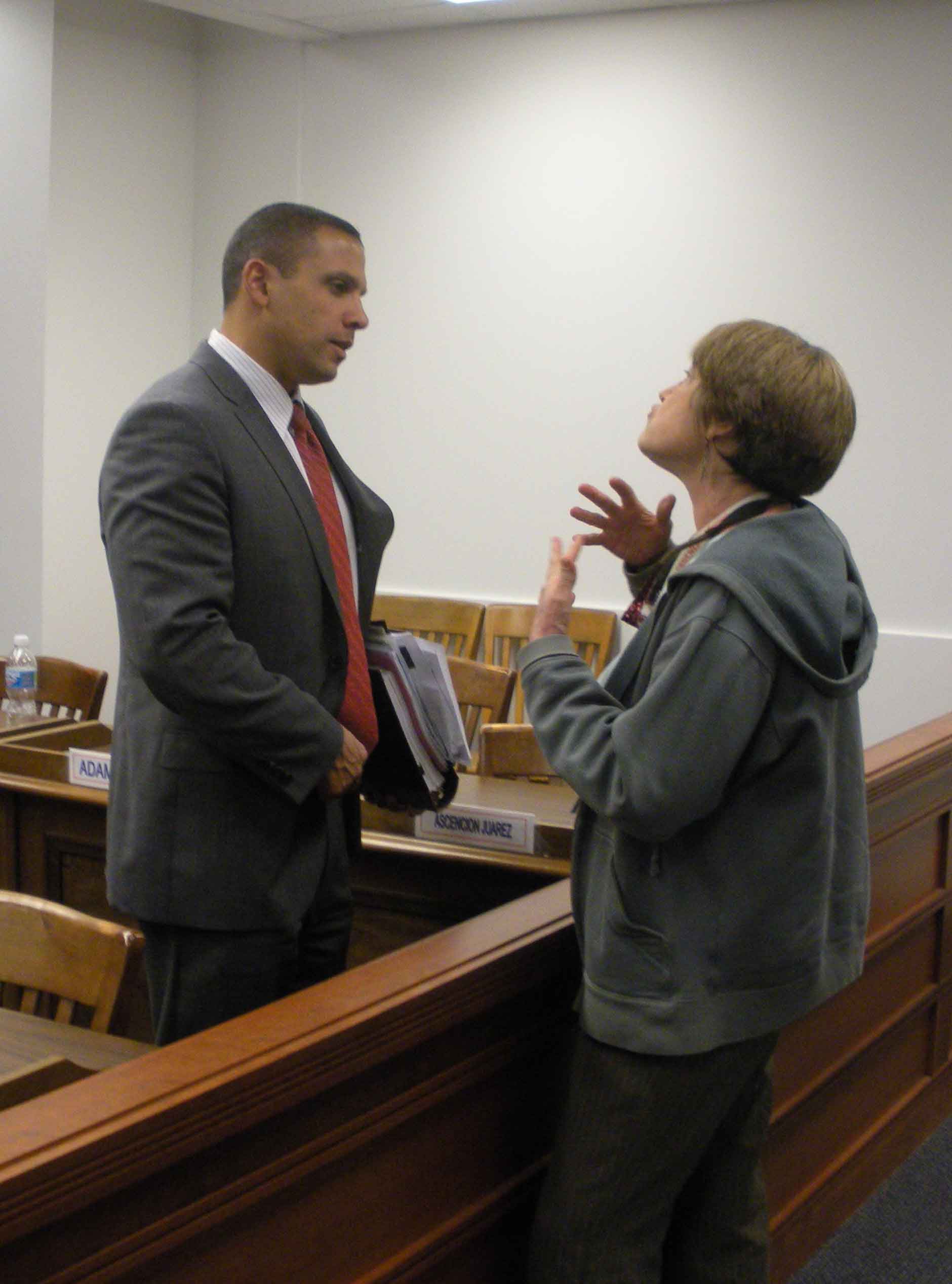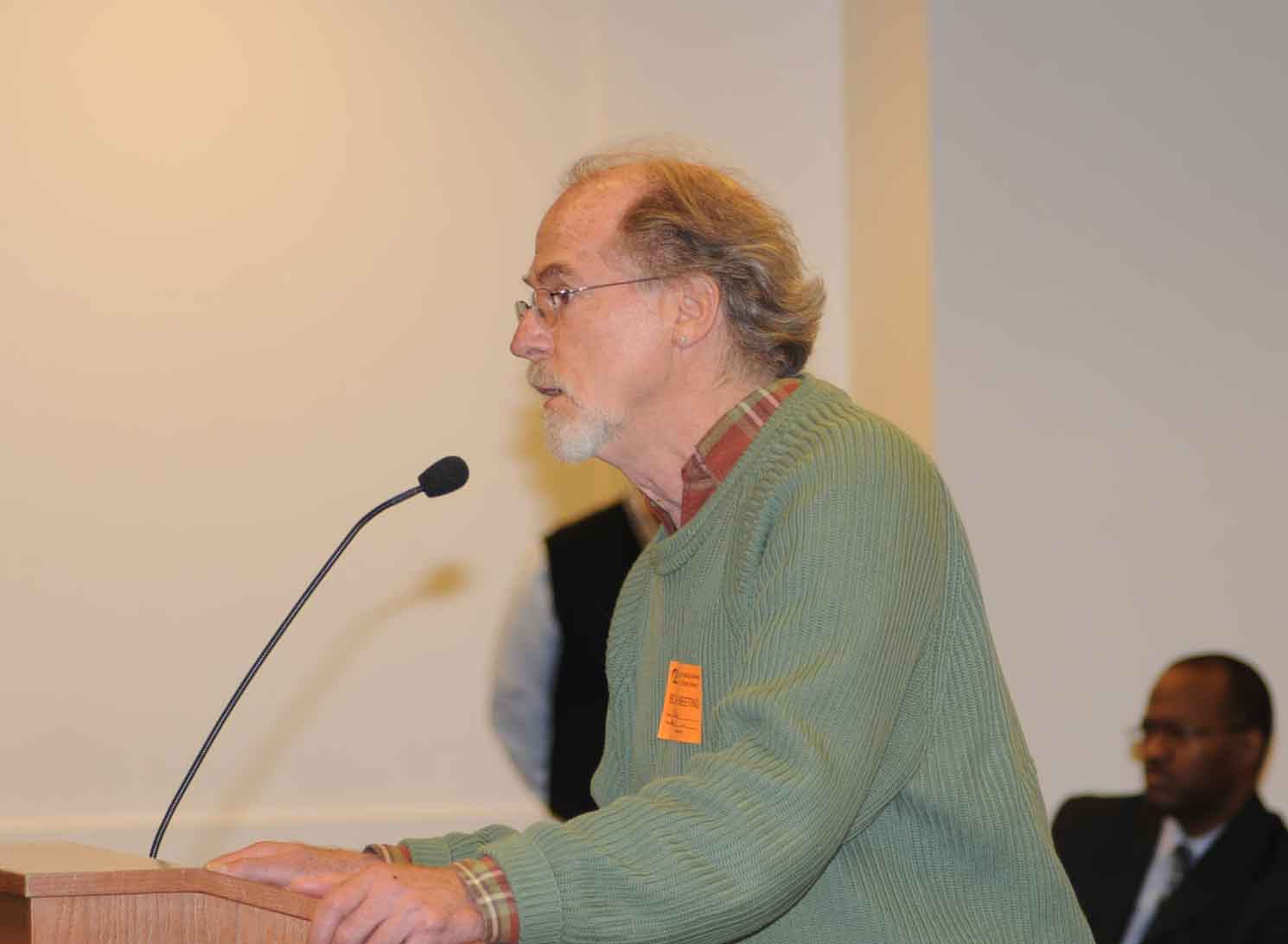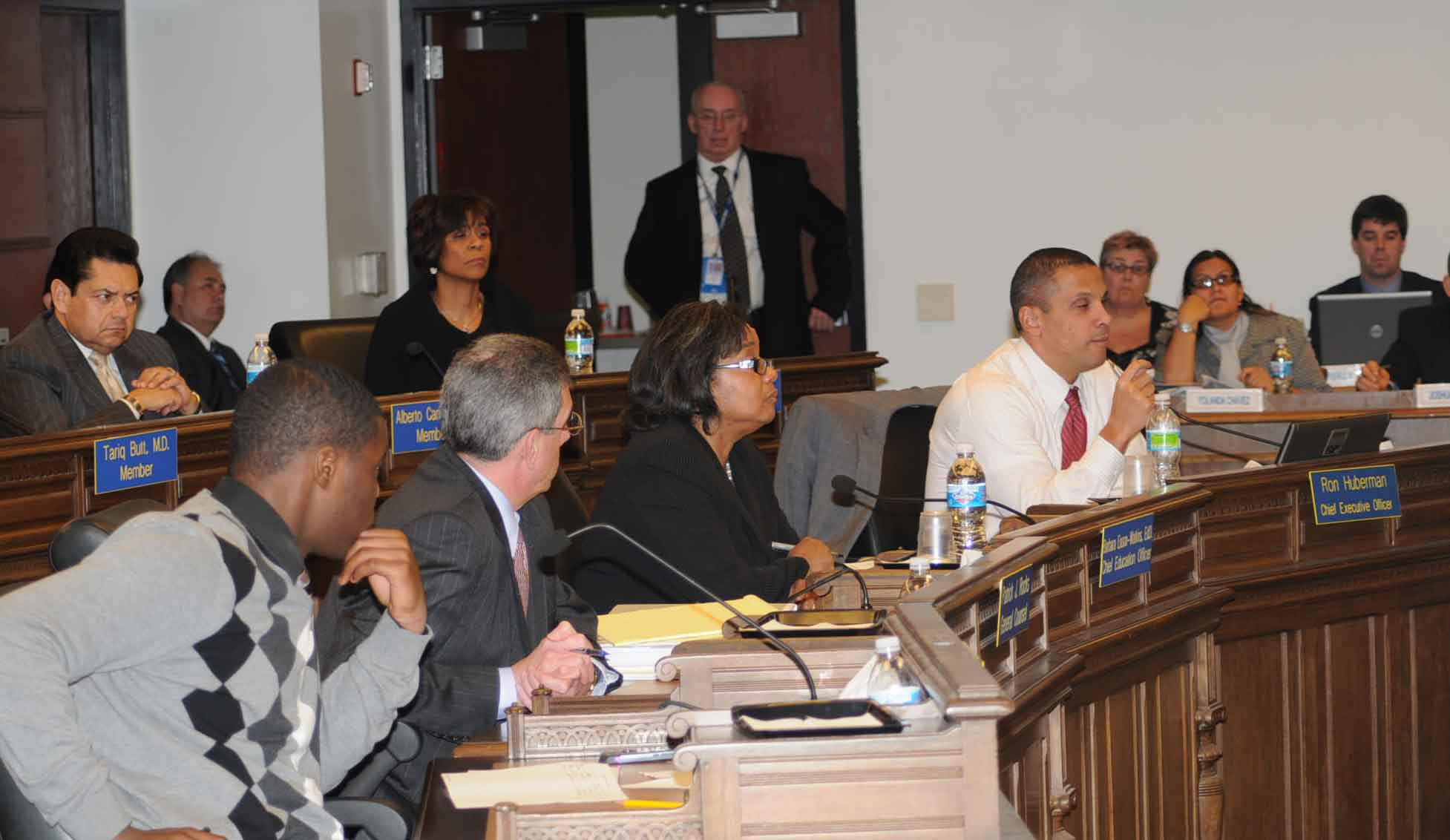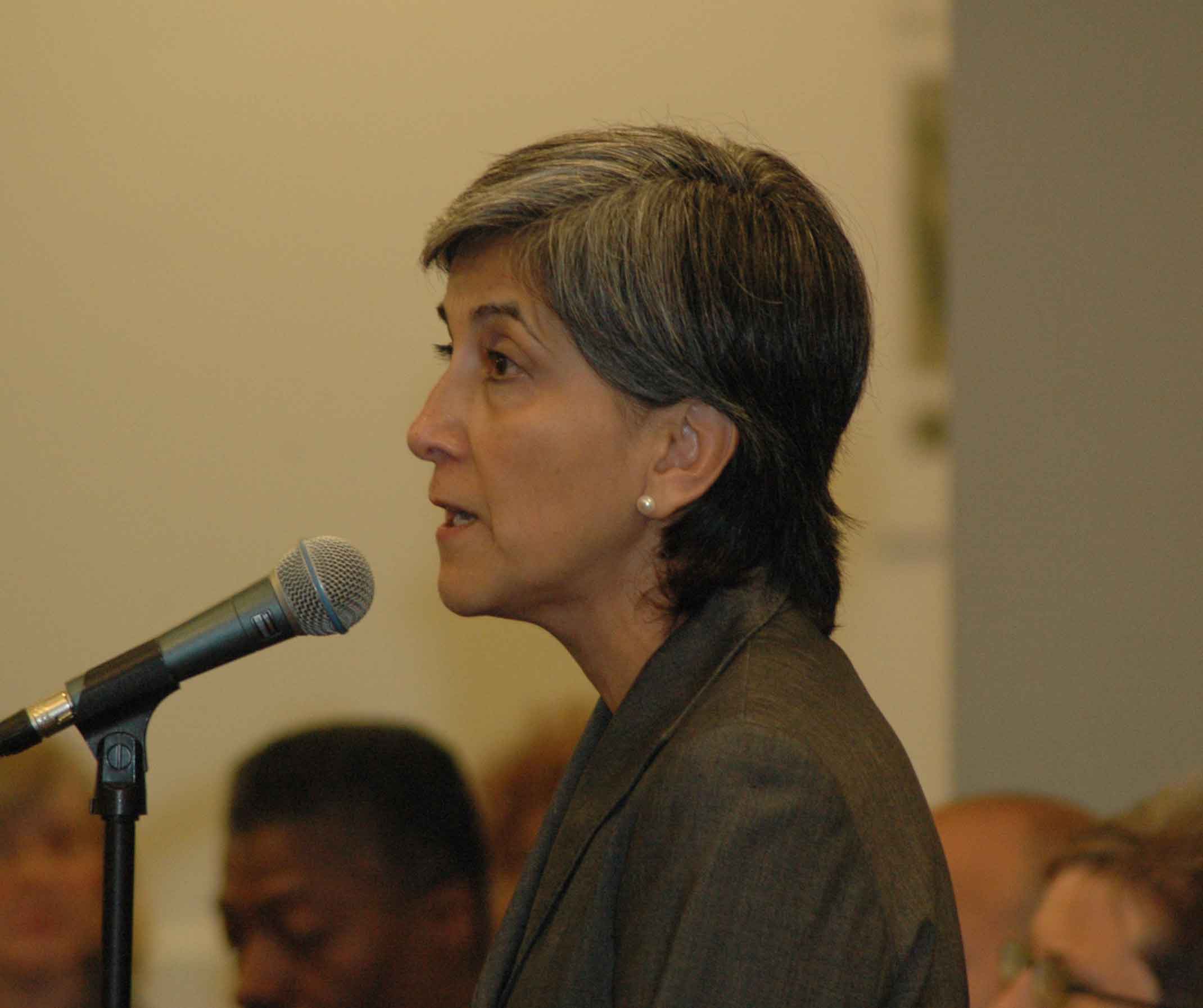How Can Chicago Hold Back One Week's Pay From All Employees This Friday (May 1, 2009)?
Teachers and other school employees are outraged that CPS is “messing with our money” and that the current CTU leadership is letting them. CPS is changing the timing of our pay. Up to now, we got paid one week after the end of the pay period. Starting May 8, we will have to wait until two weeks after the end of the pay period. On May 1, instead of getting a two-week check, as we would have under the old schedule, we will get a one-week payout of our extended pay. This is a hardship for many, as rents and mortgages come due on May 1.
 Although the timing of the Board of Education's monthly meetings excludes most of the public and teachers from participating in the "public participation" portions of the meeting (which are scheduled to begin at 10:30 a.m. on the Board's meeting days), some teachers have been able to get downtown in time for the final moments of each meeting. After work on April 22, 2009, Chicago Vocational High School teacher Carol Caref, a CORE member, arrived just as the Board was coming out of "executive session" for its brief voting session. Following the voting (which was unanimous and without debate on all items remaining on the agenda established earlier by Chief Executive Officer Rob Huberman), Ms. Caref asked to speak with Mr. Huberman, who obliged. This narrative explains what happened. Substance photo by George N. Schmidt.As part of an investigation by CORE (Caucus Of Rank-and-file Educators) into what remedies might be available, Rachel G. Resnick, Chief Labor Relations Officer, wrote, “our Payroll Director advises that individuals contact Payroll Services at 553-4729 for assistance. The Payroll staff is being instructed on how to assist individuals facing extreme hardship situations.”
Although the timing of the Board of Education's monthly meetings excludes most of the public and teachers from participating in the "public participation" portions of the meeting (which are scheduled to begin at 10:30 a.m. on the Board's meeting days), some teachers have been able to get downtown in time for the final moments of each meeting. After work on April 22, 2009, Chicago Vocational High School teacher Carol Caref, a CORE member, arrived just as the Board was coming out of "executive session" for its brief voting session. Following the voting (which was unanimous and without debate on all items remaining on the agenda established earlier by Chief Executive Officer Rob Huberman), Ms. Caref asked to speak with Mr. Huberman, who obliged. This narrative explains what happened. Substance photo by George N. Schmidt.As part of an investigation by CORE (Caucus Of Rank-and-file Educators) into what remedies might be available, Rachel G. Resnick, Chief Labor Relations Officer, wrote, “our Payroll Director advises that individuals contact Payroll Services at 553-4729 for assistance. The Payroll staff is being instructed on how to assist individuals facing extreme hardship situations.”
While it remains to be seen whether teachers and other Chicago school workers will, in fact, be able to receive assistance, many wonder why a couple of persistent CORE members who are full time teachers, were able to get this information while the Chicago Teachers Union (CTU) officers who are getting paid to work full-time for the members did not.
We have spoken to many teachers who feel that this additional week of holding on to our money adds insult to the injury of extended pay. Under "extended pay," CPS workers have their regular pay pro-rated over 52 weeks, so instead of being paid the full amount a week after the work has been completed, a certain amount is held back by CPS and paid out over the summer, under a so-called "extended pay" program. Illinois law requires that wages earned be paid no more than 13 days after the end of the pay period. This would seem to make “extended pay” illegal. However, a valid collective bargaining agreement can allow wages to be paid later, and beginning about 20 years ago, the CTU agreed to allow the Board to put workers into "extended pay" until, finally, virtually everyone who works in a school was under "extended pay." The only way CPS is able to legally conduct their extended pay scam (they collect the interest but it’s our money) is because the current and previous union leaders put it in the contract!
The details of what led to the Resnick email may be instructive.
First, CORE decided that since the CTU had agreed to the payroll change, it was our responsibility to see if we could do anything to make the change less painful for members.
 Earlier in the day, CORE member Earl Silbar, a retiree, had spoken to the Board about the issue of the May 1, 2009, payroll. It became clear during the brief dialogue between Mr. Silbar (above) and Chief Executive Officer Ron Huberman (following photo) that Mr. Huberman was not completely informed about the issues surrounding the May 1 payroll, or about the way in which "extended pay" has been functioning. Substance photo by George N. Schmidt.One of our members, Earl Silbar (a retiree), testified at the April 22, 2009, Board meeting that this plan would have a harmful impact on many people who rely on their two-week checks. Another CORE member, Jackson Potter, arranged to meet Rachel Resnick to discuss this issue. Finally, after the April Board meeting, I was able to get Ron Huberman to talk about the issue briefly. He told me he understood why this might be a hardship for some, but was under the misimpression that payroll changes would not affect teachers.
Earlier in the day, CORE member Earl Silbar, a retiree, had spoken to the Board about the issue of the May 1, 2009, payroll. It became clear during the brief dialogue between Mr. Silbar (above) and Chief Executive Officer Ron Huberman (following photo) that Mr. Huberman was not completely informed about the issues surrounding the May 1 payroll, or about the way in which "extended pay" has been functioning. Substance photo by George N. Schmidt.One of our members, Earl Silbar (a retiree), testified at the April 22, 2009, Board meeting that this plan would have a harmful impact on many people who rely on their two-week checks. Another CORE member, Jackson Potter, arranged to meet Rachel Resnick to discuss this issue. Finally, after the April Board meeting, I was able to get Ron Huberman to talk about the issue briefly. He told me he understood why this might be a hardship for some, but was under the misimpression that payroll changes would not affect teachers.
When I insisted that the changes were not just for administrators, as he seemed to think, he had me come to the office of his deputy chief of staff, 26-year-old Adam Case. Ascencion Juarez, Chief Human Resources Officer, was called in to validate that teachers would be subject to payroll changes and to explain to Case (Huberman had gone elsewhere) the details of the changes.
 Chicago Public Schools Chief Executive Officer Ron Huberman (above right, wearing red tie) responds to the issues raised by CORE's Earl Silbar during the public participation on April 22, 2009. Substance photo by George N. Schmidt.Several times, Mr. Juarez stated that the union had agreed to this.
Chicago Public Schools Chief Executive Officer Ron Huberman (above right, wearing red tie) responds to the issues raised by CORE's Earl Silbar during the public participation on April 22, 2009. Substance photo by George N. Schmidt.Several times, Mr. Juarez stated that the union had agreed to this.
It was clear that the decision to pay us a week later had been made for the sake of efficiency and interest money, and that employees’ needs were not considered. In these hard times, the working teacher may be the only breadwinner in the house, and it is especially important for that family to be able to depend on timely income. It is outrageous that both CPS and CTU neglected to think about these teachers.
I brought up the possibility of a hardship policy for May 1, similar to a previous extended pay hardship policy. Mr. Juarez made disparaging remarks about people who had requested hardship waivers in the past, before extended pay was mandatory for everyone. Mr. Case had not known about extended pay, but commented that teachers would have more money if they got paid their whole check instead of having to wait until the summer! Yes, Mr. Case, we’ve been thinking the same thing. By this time in the school year, teachers who have been working since September 2008 have a large "bank" that the Board is supposed to pay them during July, August, and into September. That afternoon, Ms. Resnick called and I told her what our concerns were. She said she thought that payroll did have a hardship provision and later followed up with the email below. At the end of the conversation, she thanked me and told me CPS wanted to know if there were problems with things they were doing. I told her I had a long list!
Communication from Labor Relations Chief Rachel Resnik to Carol Caref
From:"Resnick, Rachel G" rgresnick@cps.k12.il.us
Thursday, April 23, 2009 10:42 AM -0500
Subject:Teacher Payroll To:Carol Caref
Cc:"Case, Adam" acase@cps.k12.il.us
Dear Ms. Caref,
Per our conversation earlier this morning, I contacted Angela Alonzo, CPS Payroll Director, to obtain an answer to your question. For your information, I am attaching a table which summarizes the "combined payroll" communications sent to all CPS employees since the beginning of this calendar year.
 Chief Labor Relations Officer Rachel Resnick. Substance photo by George N. Schmidt.If I understood correctly, your main concern was what could be done for individuals facing extreme hardship. While our communications did not address hardship situations, our Payroll Director advises that individuals contact Payroll Services at 553-4729 for assistance. The
Chief Labor Relations Officer Rachel Resnick. Substance photo by George N. Schmidt.If I understood correctly, your main concern was what could be done for individuals facing extreme hardship. While our communications did not address hardship situations, our Payroll Director advises that individuals contact Payroll Services at 553-4729 for assistance. The
Payroll staff is being instructed on how to assist individuals facing extreme hardship situations. If you have further questions, you should be able to reach me at 553-3578 (office) or 773-972-5258 (cell phone).
Thank you for advocating for our colleagues
Rachel G. Resnick
Chief Labor Relations Officer
Chicago Public Schools
125 S. Clark St., 5th Floor
Chicago, Il 60603
rgresnick@cps.k12.il.us
Fax: (773) 553-3535
Phone: (773) 553-3578
Comments:
By: Carol Caref
teacher
Mary Alene Quinn hit the nail on the head. It is a disgrace that our union leadership allowed this to happen without any protest. When a member at my school contacted a lawyer to see if a lawsuit could be filed in this situation, he told her a lawsuit would be expensive, take a long time, and might not win. His advice was to get rid of the union leadership! Best legal advice I've heard in a while.
By: Dan
They've got a chance to handle this well...
If the Board is actually able to get normal paychecks to those who request them in advance, I'd say they handled this pretty well. The Union should have made everyone within the schools aware of this, since, isn't that one of its jobs?
What's the deal with the interest payments argument mentioned in the article? Why is the Board doing this in the first place?


By: Mary Alene Quinn
Payroll
Who's going to explain to the mortgage, car loan, student loan,.... companies why their automatic withdrawal may not be met this month due to the "payroll adjustment" of CPS brainiacs? Each and every teacher is affected by this May 1st payroll nightmare and consequently their credit rating is put in jeopardy. EVERYONE is entitled to "hardship" consderation. Furthermore, the time and effort spent by each teacher to address this issue takes time and effort away from their real job. Who "pays for" (is most directly affected by) the teacher's distraction? Is it the children of the City of Chicago?